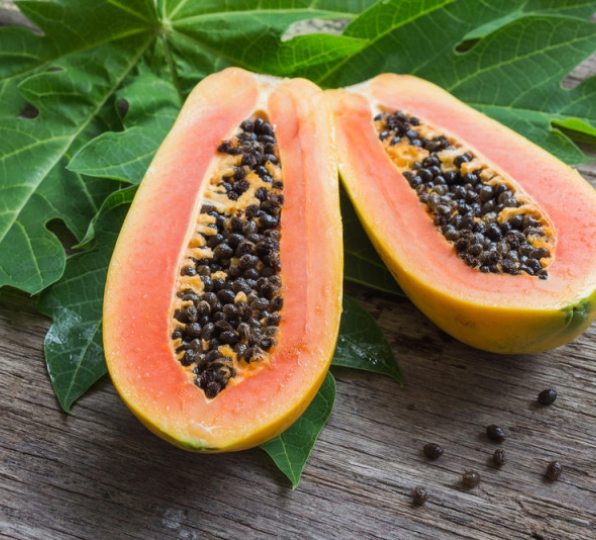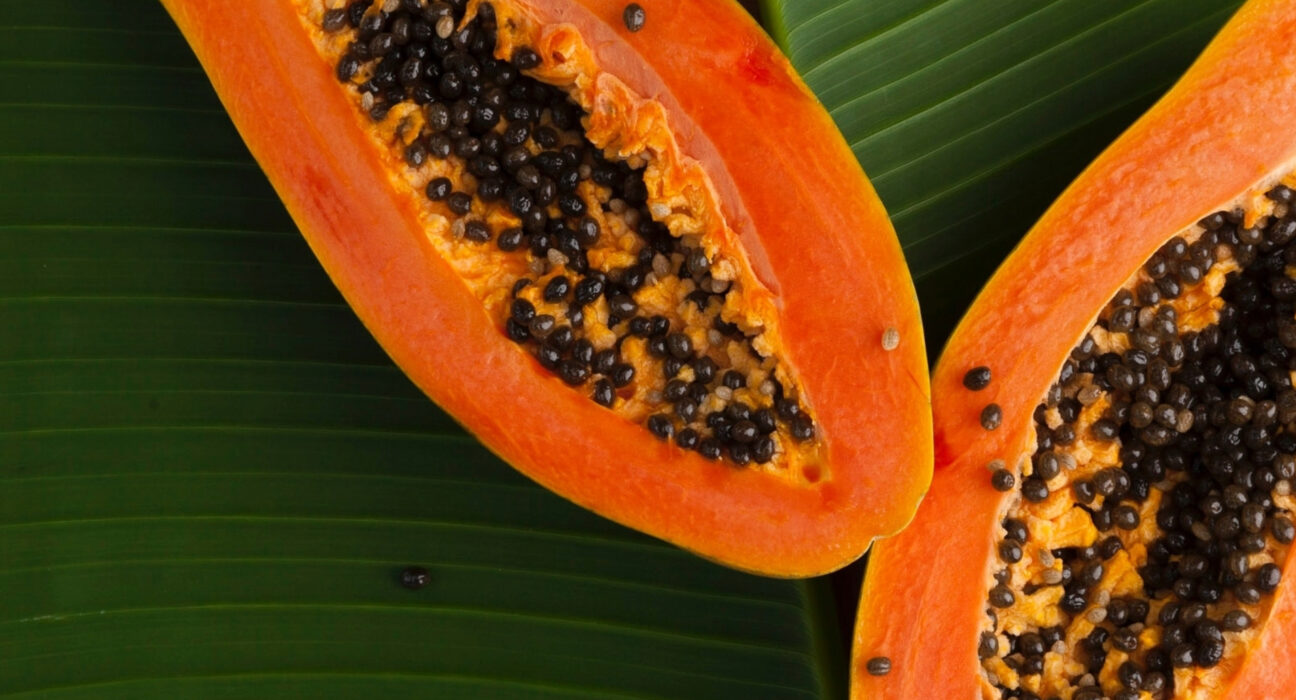Introduction:
Many foods are touted as “miracle” weight-loss remedies because they seem to melt away pounds with ease. The papaya, a tropical fruit prized for its vivid hue, sweet flavor, and alleged health advantages, is one such contender. But is papaya really the secret to losing excess weight? We’ll examine the science and viability of papaya’s purported weight-loss benefits in this blog post.
1. Nutritional Profile of Papaya
To fully appreciate the weight loss potential of papaya, it’s crucial to grasp its nutritional profile, which underscores its role as a nutritious and satisfying addition to any diet. Papaya stands out as a low-calorie and low-fat fruit while being rich in essential nutrients such as vitamin C, vitamin A, fiber, and antioxidants.
Papaya is particularly notable for its impressive vitamin C content, with just one cup of diced papaya providing over 100% of the recommended daily intake for this essential nutrient. Vitamin C serves as a powerful antioxidant that supports immune function, promotes collagen production for skin health, and aids in the absorption of iron. Additionally, papaya is a rich source of vitamin A, primarily in the form of beta-carotene, which contributes to eye health, immune function, and skin integrity.
Moreover, papaya is abundant in dietary fiber, which plays a crucial role in digestive health, weight management, and overall well-being. Fiber adds bulk to stool, promotes regular bowel movements, and helps regulate blood sugar levels and cholesterol levels. By providing a feeling of fullness and satiety, fiber can aid in appetite control and prevent overeating, making papaya an excellent choice for those looking to manage their weight.
Furthermore, papaya boasts a high water content, which contributes to its hydrating properties and helps promote feelings of fullness and satisfaction. Staying hydrated is essential for overall health and well-being, and consuming hydrating foods like papaya can support optimal hydration levels, particularly during hot weather or strenuous physical activity.
Incorporating papaya into your diet is easy and versatile, whether enjoyed fresh as a snack, blended into smoothies, or added to salads and desserts. Its naturally sweet flavor and juicy texture make it a delicious and refreshing option for satisfying cravings while nourishing the body with essential nutrients.
2. Low in Calories and High in Fiber
Papaya emerges as a stellar choice for individuals seeking to manage their weight due to its dual qualities of being low in calories and high in fiber. This tropical fruit offers a delightful combination of sweetness and nutritional benefits, making it an ideal addition to any weight management plan.
First and foremost, papaya stands out as a low-calorie fruit, making it a favorable option for those aiming to control their calorie intake. With just about 60 calories per one-cup serving of diced papaya, this fruit provides a satisfyingly sweet taste without packing on excess calories. By incorporating papaya into meals or snacks, individuals can indulge in its natural sweetness without worrying about significantly increasing their calorie consumption, making it an excellent choice for weight-conscious individuals.
Moreover, papaya is rich in dietary fiber, a nutrient that plays a crucial role in supporting weight loss efforts. Fiber is indigestible plant material that adds bulk to the diet, promoting feelings of fullness and satiety. This helps individuals feel satisfied with smaller portions, reducing overall calorie intake throughout the day. Additionally, fiber aids in digestion and regulates bowel movements, contributing to overall gastrointestinal health and well-being.
The high fiber content in papaya not only helps promote feelings of fullness but also slows down the absorption of sugars into the bloodstream. This helps prevent rapid spikes and crashes in blood sugar levels, which can contribute to cravings and overeating. By stabilizing blood sugar levels, papaya supports better appetite control and helps individuals maintain steady energy levels throughout the day, further facilitating weight management efforts.
Incorporating papaya into the diet is effortless and versatile, as it can be enjoyed in various ways, including fresh, blended into smoothies, added to salads, or paired with yogurt for a nutritious snack. Its naturally sweet flavor and juicy texture make it a satisfying and guilt-free option for curbing cravings while supporting weight loss goals.
3. Rich in Enzymes
Papaya emerges not only as a delicious tropical fruit but also as a valuable source of enzymes, particularly papain, which plays a significant role in supporting digestion and potentially aiding weight loss efforts. These natural enzymes contribute to efficient digestion, ensuring that nutrients are properly absorbed and utilized by the body, thus preventing excess calories from being stored as fat.
Papain, the most well-known enzyme found in papaya, is renowned for its ability to break down proteins into smaller peptides and amino acids, facilitating their absorption in the small intestine. This process enhances the body’s ability to extract essential nutrients from food, ensuring that proteins are efficiently utilized for various bodily functions, including muscle repair, metabolism, and energy production. By supporting optimal digestion and nutrient absorption, papain helps prevent undigested proteins from lingering in the digestive tract, reducing the risk of bloating, discomfort, and gastrointestinal issues.
Furthermore, efficient digestion is closely linked to weight management and overall metabolic health. When the digestive system functions optimally, nutrients are absorbed more efficiently, and the body can regulate hunger and satiety signals more effectively. By promoting feelings of fullness and satisfaction, adequate digestion helps prevent overeating and reduces the likelihood of consuming excess calories, which can contribute to weight gain over time.
In addition to papain, papaya contains other enzymes, such as chymopapain and caricain, which also contribute to the breakdown of proteins and the digestion process. These enzymes work synergistically to support digestive health and enhance nutrient absorption, ensuring that the body receives the essential nutrients it needs to thrive while minimizing the risk of digestive discomfort and weight-related issues.
4. High Water Content
Papaya, renowned for its juicy and succulent texture, boasts a high water content, making it not only refreshing but also a valuable ally in promoting hydration and supporting weight management goals. With its hydrating properties, papaya helps to quench thirst and maintain optimal fluid balance in the body, while also contributing to feelings of fullness and satisfaction.
The high water content of papaya plays a crucial role in promoting satiety, or the feeling of fullness and satisfaction after eating. Foods with high water content, like papaya, have a low energy density, meaning they provide fewer calories per gram compared to foods with a higher energy density. This makes them an excellent choice for those looking to control portion sizes and reduce overall calorie intake without sacrificing volume or satisfaction.
By filling up on hydrating foods like papaya, individuals can consume larger portions without significantly increasing their calorie intake. This can help prevent overeating and promote weight management by providing a sense of fullness and satisfaction while consuming fewer calories overall. Additionally, the act of chewing and digesting foods with high water content, like papaya, can also contribute to feelings of satiety and reduce the likelihood of overeating.
Furthermore, staying hydrated is essential for overall health and well-being, as water plays a vital role in numerous bodily functions, including temperature regulation, nutrient transport, and waste elimination. By consuming hydrating foods like papaya, individuals can support optimal hydration levels and maintain proper bodily function, contributing to overall health and vitality.
Incorporating papaya into your diet is easy and delicious, whether enjoyed fresh as a snack, blended into smoothies, or added to salads and desserts. With its naturally sweet flavor and juicy texture, papaya offers a satisfying and nutritious way to stay hydrated and support weight management goals.
5. Provides Nutrient-Rich Fuel
Papaya, with its enticing tropical flavor and vibrant color, stands out not only as a low-calorie option but also as a nutritional powerhouse packed with essential nutrients vital for overall health and well-being. Despite being low in calories, papaya boasts a rich array of nutrients, including vitamin C, vitamin A, potassium, and antioxidants, making it a valuable source of nutrient-rich fuel that supports energy levels and metabolism, crucial components of successful weight loss efforts.
One of the standout nutrients in papaya is vitamin C, a powerful antioxidant that plays a key role in supporting immune function, collagen synthesis, and wound healing. Additionally, vitamin C enhances the absorption of iron, a mineral essential for transporting oxygen throughout the body and maintaining energy levels. By providing a generous dose of vitamin C, papaya supports overall health and vitality, ensuring that the body has the necessary resources to function optimally.
Moreover, papaya is rich in vitamin A, primarily in the form of beta-carotene, a precursor to vitamin A that supports eye health, immune function, and skin integrity. Vitamin A is also involved in regulating gene expression, cellular differentiation, and growth, making it essential for overall health and well-being. By providing a source of vitamin A, papaya contributes to the body’s ability to maintain optimal function and energy levels, supporting weight loss efforts.
Potassium, another essential nutrient found in papaya, plays a crucial role in maintaining fluid balance, regulating blood pressure, and supporting muscle function and nerve transmission. Adequate potassium intake is essential for optimal energy metabolism and physical performance, making it an important nutrient for individuals looking to lose weight and improve overall health.
Additionally, papaya contains antioxidants such as beta-carotene, lycopene, and flavonoids, which help neutralize free radicals and protect cells from oxidative damage. By reducing oxidative stress and inflammation, antioxidants support overall health and well-being, while also promoting optimal energy levels and metabolism.


Conclusion:
While papaya alone is not a magic solution for weight loss, it can certainly be a valuable addition to a balanced diet and healthy lifestyle. With its low calorie, high fiber, and nutrient-rich profile, papaya can support satiety, digestion, and overall well-being, making it a helpful ally on your weight loss journey. By incorporating papaya into your diet alongside other nutritious foods and regular physical activity, you can enhance your efforts to achieve and maintain a healthy weight. As always, it’s essential to consult with a healthcare professional or registered dietitian for personalized guidance on weight loss and nutrition.












